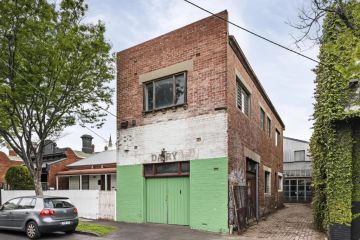When you're forced to sell your parents' entire home contents

I’d known for years that my parents were moving back to Poland; they’d been preparing to return to their country of birth since 2011. Buy house in Poland: check. Slowly furnish it: check. Start dealing with all the clutter back in Melbourne: check (but not until 2015).
By the end of last year, all that was left was selling their home here. Although it wasn’t very old – we built it in 2004 – it was the house we’d lived in the longest as a family. As a result, it was, and still is, the most familiar space to me: a lovely four-bedder with a study, two bathrooms, a living room, rumpus room, kitchen and garden, complete with a silly (but very lovable) little dog. The classic Aussie dream.
So when they called me just before Christmas and said they’d sold it, it was hard.
What turned out to be harder was their plan to move out by February.
“What are you going to do with the furniture?” I asked.
“Just throw it out, I suppose,” said dad.
“It’s not worth anything anyway – it’s all second-hand. Who’s going to buy second-hand stuff?” asked mum.
Um. A LOT OF PEOPLE. And considering much of their furniture was barely used and had been purchased at department stores like Harvey Norman, the quality was fairly good. Solid pine tables, bookshelves and bed frames; beautiful striped cloth and leather couches; digital, big screen TV, and, not to mention the hundreds of (crystal) glasses, kitchen-ware (my mother is an amazing cook with all the gadgets to prove it) discarded-yet-still-working old laptops, phones, printers, fridges, washing machine and so much more.
So, when I gasped at the thought of throwing all that out, my parents made me an offer: if you sell it all, you get to keep the money. Otherwise, we’re driving it out to the tip.
As someone who does not relish organising things, I knew this was going to be a challenge. But I didn’t want to throw the entire home out: it wasn’t even about the money. It was the fact that all those possessions represented a memory, a moment in time which I cherished. The time we went to McDonald’s (the biggest treat in the world for a 12-year-old) after buying two paintings at Queen Victoria Market, and that time we went to Highpoint to look at Target but came back with a MacBook and the softest rug imaginable on which many happy evenings we spent playing with the dog. You can’t just throw all that away.
I started where most novice furniture-sellers do: Gumtree. I took photos of the items I wanted to sell, prettied them up a bit (you have to adjust the colours, you see) and put up a description. Some items, such as the virtually untouched TV cabinet, went quickly – too quickly. We set the price for $80 but, in hindsight, it would have gone for $120 easily.
I fielded calls from buyers all day, ducking to the toilets at work or texting back, saying I could only talk after hours, only to find out the buyer was no longer interested. It was a full-time job and one I was unprepared for. Selling one or two items is one thing: but an entire house? Nightmare.
Thankfully, the best items were soon gone. The wooden beds, bedside tables and bookshelves flew off the shelves, and, while many wanted to buy the Bosch washing machine ($250 – what a bargain!), mum insisted she needed it until the last few days before they flew out because she didn’t want to wash her clothes in a friend’s machine.
As I soon discovered , my parents were not as willing to “throw it all out” once price negotiations came into the equation. I’d once read that we value the items we are trying to sell as much higher than a stranger would. To us, they are not merely inanimate objects, but attached to a memory or an event that is priceless. To a buyer, however, it is, at most, a good deal – if the price is low enough.
So what began as a process between the buyers and myself ended up including my parents and their views. People would come over to view the furniture while I wasn’t there, and I’d later find out my parents had bargained down an entire bedroom suite for $150.
“She was so nice and the cupboards were scratched and one drawer wasn’t working properly – I couldn’t sell that! I gave it for free,” mum told me later while I banged my head on the wall.
Or: “He was a poor Russian man whose wife is pregnant so we gave him a discount for that table,” which turned out to be $200 down to $50. Sigh.
But we got through it. Eventually, only a few key pieces were left – albeit they were a huge dining table and a huge glass cabinet that would actually cost money to dispose of.
My boyfriend, who had been helping me through this process, suggested we throw a garage sale for all the smaller items and those that failed to sell on Gumtree. It was stressful and required more money and effort to advertise than it was really worth, to be honest. Although we ended up making $300, it was a very long day and most items still remained.
I gave up.
“Just throw it all out,” I told my parents.
“But what about the juicer? Don’t you want it? And the kitchen aid? And the glasses? And the …” The list went on. My parents, now stuck with actually throwing it all away, were trying to offload it to me and my tiny two-bedroom apartment which was already brimming with my own stuff.
I ended up taking the TV, sound system, a couple of paintings, the Dyson vacuum cleaner and my parents’ crystal glasses wedding present set. I figured it would be years before I could afford a $900 vacuum cleaner and some proper artwork.
What the whole saga taught me was: don’t leave selling your home and everything in it to one month. The stress is not worth it.
Oh, and you’d better brush up on those negotiation and interpersonal skills everyone talks about. And lower your expectations. It’s a dog-eat-dog world out there and everyone just wants a bargain.
TIPS for selling your items
Gumtree: It’s free and depending on what you’re selling, you can get rid of stuff quite quickly, as this is the place to go for bargain hunters. If you want your stuff to sell more quickly, you can pay to have your ads feature high up on the homepage, or be the first to come up in a certain category.
eBay: Similar to Gumtree but more formal; if you know your way around eBay, it’s a great selling tool.
Social media: Facebook, Twitter, whatever social media you use, it can be useful to just share a couple of posts with friends, who can pass it onto their friends. Also worth searching for social media groups such as “Inner West: Buy, Swap and Sell” or similar in your area.
Local paper: If you have a lot of time, consider advertising in your local paper. They take ads about two weeks in advance, so if you’re planning a garage sale, that’s a good way to do it. Caution: a single as can cost $40 or more, so figure out whether it’s worth it.
States
Capital Cities
Capital Cities - Rentals
Popular Areas
Allhomes
More







